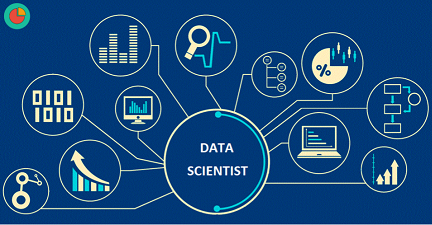 The Most new type of the artist is “Data scientists” Yes, as I am saying The Artist, they are indeed the artist as they take a huge mass of messy data sets, some time unstructured as well and use their artistic skills and special tool (The Analytical Software) and creates most amazing, detailed but still simple results to help many, starting from business till the Governments. They have change the world’s decision methodology drastically, we all are taking a better decision as somewhere or other, our all decisions are backed by the some or other, small or big artistically worked data science.
The Most new type of the artist is “Data scientists” Yes, as I am saying The Artist, they are indeed the artist as they take a huge mass of messy data sets, some time unstructured as well and use their artistic skills and special tool (The Analytical Software) and creates most amazing, detailed but still simple results to help many, starting from business till the Governments. They have change the world’s decision methodology drastically, we all are taking a better decision as somewhere or other, our all decisions are backed by the some or other, small or big artistically worked data science.
Data Scientist Responsibilities
“A data scientist is someone who is better at statistics than any software engineer and better at software engineering than any statistician.” Little tricky, but true and straightforward statement I read somewhere on the web and it just right, I believe.
A data scientist may be required every day to:
-
Collect and organize an extract huge volumes of data from multiple sources, Internal as well as external
-
Make the data usable by the sophisticated analytics software, this includes preparing data sets or cube or tables.
-
Use the analytics programs or software, machine learning and statistical methods to prepare data for use in predictive and prescriptive modeling
-
Thoroughly check and try to clean the data collected to discard the information may not important for the analysis subject.
-
A data scientist must see the sights and examine data from all different angles to determine hidden weaknesses, trends
-
Devise data-driven solutions to the most pressing challenges
-
Invent new algorithms to solve problems and build new tools to automate work
-
Communicate predictions and findings to management and IT departments through effective data visualizations and reports
-
Recommend cost-effective changes to existing procedures and strategies
Every company will have a different take on job tasks. Some treat their data scientists as glorified data analysts or combine their duties with data engineers; others need top-level analytics experts skilled in intense machine learning and data visualizations. As data scientists achieve new levels of experience or change jobs, their responsibilities invariably change. For example, a person working alone in a mid-size company may spend a good portion of the day in data cleaning. A high-level employee in a business that offers data-based services may be asked to structure big data projects or create new products.
Data Scientist Qualifications
 There is no such boundary on what Kind of degree will you need to be a Data Scientist, however, preferably, one having below two education can be considered the best fit for taking the career as a data scientist:
There is no such boundary on what Kind of degree will you need to be a Data Scientist, however, preferably, one having below two education can be considered the best fit for taking the career as a data scientist:
A degrees graduate from the computer engineering or diploma certificates of similar level. However, this is not must as any graduate can take up the career as the data scientist, all he or she needs is good hand on computer and programming and sharp reasoning abilities.
Certification from the Analytics software providers, say,
Dell Technologies Data Scientist Advanced Analytics Optimize 2023
Dell Technologies Data Scientist and Big Data Analytics Foundations 2023
The D-DS-FN-23 certification tests your ability to apply common techniques and tools required for big data analytics. Candidates are judged on their technical expertise (e.g. employing open source tools such as “R”, Hadoop, and Postgres, etc.) and their business acumen (e.g. telling a compelling story with the data to drive business action).
Academic qualifications may be important than you imagine, and the analytics software is most important, yes these are beyond your imagination important. it’s unbelievably rare for someone without a degree in computer programming or certification on data scientist from software provider and he or she is a data scientist. In its data science salary report, Burtch Works determined that 88% of data scientists have a master’s degree and 46% have a Ph.D. The majority of these degrees are in rigorous quantitative, technical or scientific subjects, including math and statistics (32%), computer science (19%) and engineering (16%). Also, companies are desperate for candidates with real-world skills. Your technical know-how may trump preferred degree requirements.
Business Skills
Analytic Problem-Solving: Approaching high-level challenges with a clear eye on what is important; employing the right approach/methods to make the maximum use of time and human resources.
Effective Communication: Detailing your techniques and discoveries to technical and non-technical audiences in a language they can understand.
Intellectual Curiosity: Exploring new territories and finding creative and unusual ways to solve problems.
Industry Knowledge: Understanding the way your chosen industry functions and how data are collected, analyzed and utilized.
